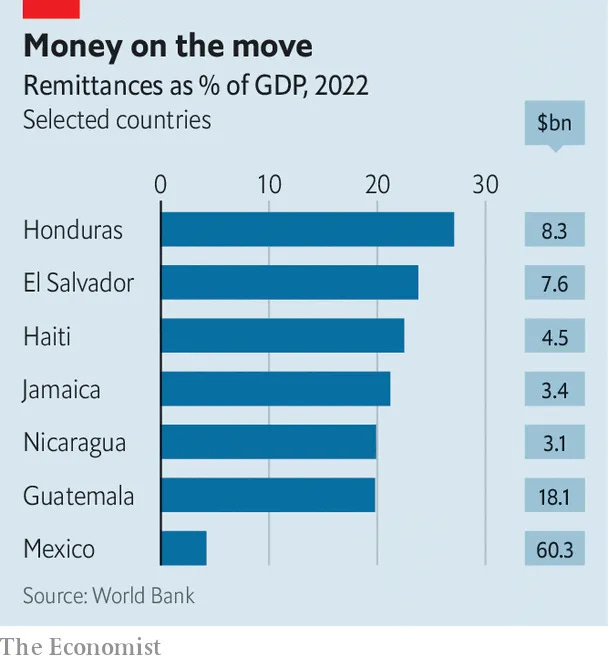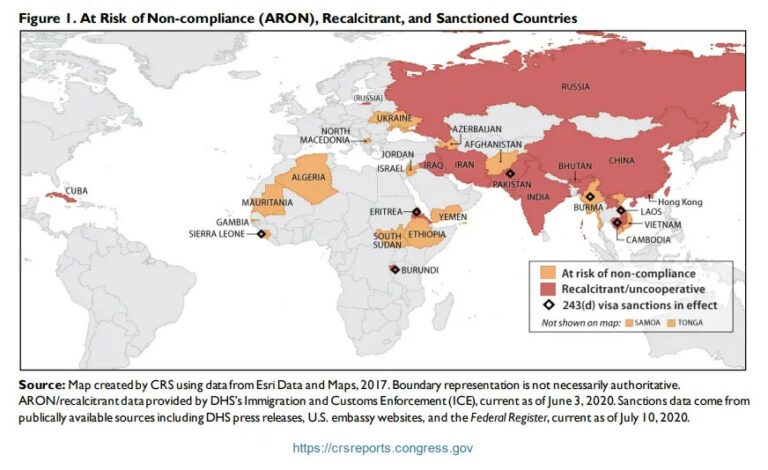The Great Repatriation: the return of non-Whites to their respective ethnic homelands, is the cornerstone of our policy agenda here at White-Papers. While we do not doubt that this can be accomplished, and have written extensively about states that could be our allies in this cause other states will, at least in the beginning, be opposed to any Great Repatriation project by White nations.
The United States classes countries that are unwilling to take back their citizens as recalcitrant states, while the European Union has termed them uncooperative countries of origin. Regardless of the terminology, nationalist (and other) policymakers will need a plan to force the numerous countries that refuse to take back their nationals and ethnic kin to do so.
Generally, nations are uncooperative by refusing to confirm the identity of their suspected citizens who have committed crimes or other offenses in Western states that wish to deport the individuals.
In this piece, we will outline several actions that policymakers can and should take to force recalcitrant, uncooperative, and reluctant states to cooperate. Many of these actions are policies that the American, European, and other governments understand are already at their disposal but for a variety of political reasons (mostly to do with favouring demographic replacement), they have chosen not to pursue these policies even when required by law to do so.
Visa Restrictions
Both the United States and the European Union already have “laws on the books” that enable immediate and unilateral suspension of the issuance of visas to foreign nationals of any state. The United States Immigration and Nationality Act (section 234(d) and the European Union’s unitary Visa Code enable governments to cease issuing visas to foreign nationals of states who do not cooperate with Western nations.
The United Kingdom too has a mechanism to cease issuing visas. The Home Secretary can suspend, revoke, and ban the issuance of visas to any national(s) or any country if the Secretary feels that banning these nationals would be “conducive to the public good.” It is quite easily argued that if these countries will not take back the citizens the UK wishes to deport then having more citizens from those countries in the UK is harmful to the public good.
Expanding on the effectiveness of this particular policy tool, Ambassador Michele Thoren Bond has testified before the US Congress that visa restrictions are an effective tool at convincing recalcitrant states to cooperate, but as is typical with the modern government of the US, the State Department is not enforcing these rules. A 2020 Congressional Report also backs up these claims of visa restriction effectiveness. The report outlines how the nation of Guyana was subjected to visa restrictions under the Trump Administration and relented after two months, finally issuing travel documents for 113 criminal Guyanese the United States sought to deport.
In another example cited in the report sanctions placed on Gambian government officials and their families in 2016 eventually caused the country to relent and begin cooperating with the United States in the deportation of Gambians.
This policy option does not mean that nationalist policymakers must escalate all at once, however. Many states feel the pressure of a simple threat to begin restricting visas. Those states with many students, professionals, or remittance-sending workers in the West are going to be particularly responsive to the simple threat of a suspension of visa issuance.
Nationalist policymakers must take visa restriction from being an extremely rarely used tool to a tool of frequent use. Countries must know that any attempt to delay or disassemble a White country’s attempt to deport racial foreigners will be met with severe consequences. A foreign nation’s businessmen, politicians, wealthy, and influential will no longer have access to the West so long as a nation refuses to cooperate.
Visa Cancellation:
If countries remain uncooperative in the face of an initial round of visa cancellation the natural escalation is to begin systematically cancelling the visas of their other citizens resident in Western countries. In many cases, these non-criminal citizens will be working professionals, diplomats, and other moderate to high earners who send significant remittances back to their countries of origin.
Some 12% of scientists in the United States trace their origins to India, with a large share of them residing in the US on various categories of work visas. Similarly, Chinese investors and corporate magnates own more than 2,400 US companies and make tens of thousands of round trips to the United States each year. If these business leaders, academics, and investors no longer have access to their US-based resources it will be their own governments that are to blame.
Both India and China are classed as uncooperative states by the United States and should they remain uncooperative the US should make it clear to their affected upper classes that the visa cancellations and non-issuance are the fault of their governments.
Remittance Restrictions
If visa restrictions do not prove an effective tool, or for some reason are an inappropriate tool at the time, there is the possibility of restricting remittances to foreign nations.
Many countries such as Honduras, India, the Philippines, and Jamaica depend on remittances to keep their local economies afloat. In some nations, such as the aforementioned Honduras, remittances make up a large share of GDP (nearly 30%) while other states such as India receive significant remittance amounts in total dollar terms. In 2022 India became the first nation in the world to receive more than $100 billion in remittances in a single year.

Of the $831 billion in global remittances that crossed borders in the 2022 calendar year the lion’s share crossed from White countries to non-White countries. This is a wealth transfer that takes place each year and has been growing rapidly in recent years.
The United States has a history of limiting remittance payments to nations the federal government does not politically align with. Remittance restriction regimes have been applied, on and off, to Cuba for decades and the US government retains the right to enforce such restrictive policies against other states.
India is the perfect example of a remittance restriction candidate. If the Indian state does not want to cooperate with US deportations (and it currently is uncooperative) then a pro-White American state must withhold all remittance payments during any Great Repatriation schemes. The Indian government and Indian citizens will miss out on tens of billions of dollars in transfers that could be made while the 4.4 million Indians in the US continue to work until eventually being asked to leave.
Restrict Luxury Goods Exports
The export of food is necessary for American farmers and the hungry of the world. The export of fuel keeps the global economy moving, and the movement of steel or aggregates assures that industrial society keeps on moving.
But one thing that does not keep the world moving, but which is significant to any elite, is the ability to purchase luxury goods.
The largest producers of luxury goods in the world are located in Europe: France, Italy, Germany, and these state’s largest export markets are often nations that refuse to cooperate in deportations.
African elites and the Chinese ruling class are some of the largest purchasers of luxury goods on the planet, so they are liable to be “harmed” by not having access to them.
The United States and European Union have already imposed sanctions regimes on Russia which prevent the export of luxury goods to that state. These regimes should be expanded to any state that is reluctant to cooperate in the return of its nationals.
By starving the elite of Africa, Asia, and the general developing world of the cars, watches, and luxury goods that give them domestic standards of living, we can force said elites to cooperate in order to serve their personal greed – all while avoiding harming their populations through a more general sanctions regime. Such regimes rarely work and are generally more damaging to the most vulnerable sectors of society, while policing a range of luxury goods companies is far simpler.

Still, there are some nations that have recently signalled a willingness to cooperate.
Bukele’s El Salvador has voiced a continuing willingness to accept criminals of El Salvadoran origin from both Europe and the United States so that they may serve out their terms in Bukele’s prisons rather than comfortable Western establishments.
The West has tried the “carrot” approach for decades and it has only resulted in steadily worsening rates of return from Europe and the United States.
This article originally appeared on White-Papers and is republished by The Noticer with permission. Follow the White Papers Policy Institute on Telegram here.
























